Occupy Central
Occupy Central is a civil disobedience movement which began in Hong Kong on September 28, 2014. It calls on thousands of protesters to block roads and paralyse Hong Kong's financial district if the Beijing and Hong Kong governments do not agree to implement universal suffrage for the chief executive election in 2017 and the Legislative Council elections in 2020 according to "international standards." The movement was initiated by Benny Tai Yiu-ting, an associate professor of law at the University of Hong Kong, in January 2013.
OCCUPY CENTRAL - DAY 40: Full coverage of the day’s events
The public have spoken - they want the Occupy protest to end
PUBLISHED : Thursday, 06 November, 2014, 5:21am
A recent survey showed that 73 per cent of the public think it's time to end the occupation. Photo: Reuters
As the Occupy Central impasse drags on, those behind the civil disobedience movement find themselves under growing pressure to review their strategy. The ideas being considered are anything but constructive, ranging from the chief executive dissolving the legislature to pan-democratic lawmakers resigning to trigger a "referendum" in the form of by-elections.
The suggestions are nothing new. The first comes from Basic Law Article 50, which says the city's leader can disband Legco when the government budget or important bills are vetoed. The second was carried out in 2010 by five pan-democrats, who resigned en masse to force city-wide polling the lawmakers intended to be a vote on democracy.
That the government has wasted no time in dismissing the ideas is hardly surprising. Article 50 is not a step to be taken lightly. A similar situation emerged nine years ago when the legislature voted down electoral reforms for 2007 tabled by Donald Tsang Yam-kuen when he was chief executive. But Tsang did not resort to such an extreme step. More importantly, dissolving Legco will not necessarily break the deadlock. It is believed that even if 2017 electoral reforms are vetoed in Legco, Beijing will not yield to pressure and modify the framework. Should pan-democrats continue to hold veto power in the new Legco, the chance of a breakthrough would be just as bleak.
Equally ill-conceived is the resignation plan. Occupy Central organisers already held an unofficial city-wide vote in June, in which 800,000 people expressed their aspirations for genuine universal suffrage. If the ballot and weeks of street protests failed to force any changes, what would another ballot achieve?
Although student leaders believe a referendum is a good way to sustain the campaign's momentum, pan-democrat lawmakers are not so sure. If the 2010 experience is any reference, it does not bode well in terms of the public's response - turnout was a record low 17 per cent. In the end, the five lawmakers did nothing more than waste HK$150 million to regain the seats they had given up. Even if the students can convince lawmakers to take up the baton, there is also no guarantee that protesters will retreat.
People's patience is running out as the campaign enters its 39th day. A recent survey showed that 73 per cent of the public think it's time to end the occupation. The protesters should heed the call and free our streets.
This article appeared in the South China Morning Post print edition as Heed the public and end protest
Protesters, police clash in Mong Kok as 'Guy Fawkes' flash protests raise tensions
PUBLISHED : Thursday, 06 November, 2014, 7:29am
Protesters wearing Guy Fawkes masks hold up a banner near Mong Kok. Photo: SCMP Pictures
Scuffles broke out at the protest site in Mong Kok in the early hours of Thursday, where dozens of protesters were subdued and pushed to the ground by police officers.
At around 2am, scores of protesters gathering on a pavement near Portland Street clashed with police as officers tried to force them back into the protest site.
The protesters, some wearing construction helmets, shouted insults at police and complained about the way officers handled them earlier.
The scuffles broke out after a protester aimed a photographic flash at police before midnight, other protesters said. Television footage showed officers pushing the man, who was bleeding in his face, against metal barricades at a distance from a crowd.
Another protester, who suffered scratches to his face, said he was dragged to the ground by policemen and his head was injured during the scuffle.
Three men were arrested.
Earlier on Wednesday night, dozens of people wearing Guy Fawkes masks marched to the protest sites in Mong Kok and Admiralty, causing brief but tense standoffs with police.
Around 50 people wearing Guy Fawkes masks gathered on a pavement by Lung Wo Road in Admiralty at about 10pm, chanting "I want genuine universal suffrage". The police briefly closed one traffic lane to prevent them from storming into the road and blocking traffic.
But the masked crowd soon dispersed and wandered around in Central.
Some police officers followed the dispersed protesters and ordered them not to stay on the road. Some of the mask-wearing protesters returned to the protest site after 1am.
The "flash mob" protests appeared to be related to Guy Fawkes Night on November 5, which commemorates the foiling of a plot to blow up the Houses of Parliament in London in 1605.
In Alan Moore's popular comics turned film V for Vendetta, main character V urges anonymous crowds to rise and fight against the establishment on November 5. The film has since turned the Guy Fawkes mask into a popular symbol among anti-establishment protesters around the world.
Separately, in Mong Kok, about 100 protesters in Guy Fawkes masks also marched within the occupied zone at about 9pm, with some putting up yellow umbrellas and chanting “I want genuine universal suffrage” and “down with Leung Chun-ying”, the chief executive. Some of them also marched inside Langham Place mall.
Two hours later, a brief scuffle broke out between protesters and police officers. A number of protesters were taken away from the protest site by police.
PUBLISHED : Thursday, 06 November, 2014, 4:23pm
UPDATED : Thursday, 06 November, 2014, 4:23pm
Time for student protesters to consider a tactical withdrawal
Albert Cheng says as public tolerance for blocked roads wears thin, the Occupy movement must prepare for the next phase of action, post clearance
Those who have been sleeping on the streets deserve respect. Yet, it is a fact that their action has resulted in major inconveniences and even financial losses to some. Photo: AP
Student leaders need to make a decisive call on where the Occupy movement should head next. If they don't, they will play into the hands of the authorities, given that public tolerance for the disruptions caused by the prolonged protests is wearing thin.
As revealed by the University of Hong Kong's recent opinion poll, the Federation of Students has become the most popular political group in town, eclipsing the political parties and trade unions across the political spectrum. This is to be expected, as the students have achieved in less than two months what pan-democratic lawmakers have failed to attain over the past three decades.
The demand for a complete overhaul of our lopsided electoral system has never been so loud and clear, and the pressure on the establishment for change has never been more intense since China resumed sovereignty over Hong Kong in 1997.
Those who have been sleeping on the streets in Admiralty, Causeway Bay and Mong Kok deserve respect. They are the ones who have made the biggest personal sacrifices to pursue the goal of genuine democracy. Yet, it is a fact that their action has resulted in major inconveniences and even financial losses to some.
As indicated by a Polytechnic University survey, 73.2 per cent of people surveyed say the protesters should quit the occupied sites. This does not mean the students have lost popular support. The figure only shows that an overwhelming majority disagrees with their tactics of continuing to block some of our main streets.
The idea of asking pan-democrats to resign from the legislature to trigger territory-wide by-elections has been floated. This could be interpreted as a pseudo-referendum on whether protesters should withdraw.
The students can further publicise their demands for true democracy through the by-elections. The total portion of votes the pan-democrats could get, rather than the number of seats they could retain, should be used as the yardstick for success.
Nonetheless, some councillors are dragging their heels. After all, those who resign would be barred from seeking re-election and will suffer substantial financial losses in terms of allowances and stipends.
Meanwhile, the authorities have learned their lesson. There has been no further attempt to disperse the crowds by force. Instead, Chief Executive Leung Chun-ying is playing a waiting game. He simply sits back and lets the public grievances against Occupy grow.
Occupy is meant to exert maximum pressure on the Leung administration. Nevertheless, events have taken such a turn that Occupy is exerting even greater pressure on its organisers.
No social movement that is at odds with popular opinion can keep going. Many community leaders have already urged the students to withdraw. I have no intention of adding to the symphony. My point is that the students should not become sitting ducks.
The Federation of Students is considering petitioning top officials in Beijing. They are doomed to be denied entry, let alone get to talk to anybody in the Chinese bureaucracy.
The head of the Democratic Alliance for the Betterment and Progress of Hong Kong, Tam Yiu-chung, has pledged to arrange for the students to meet officials in Beijing. Tam, a shrewd opportunist, has obviously been authorised as a messenger. The students leaders should jump at the opportunity.
They might be able to see Wang Guangya , director of the State Council's Hong Kong and Macau Affairs Office. They might even end up presenting their case to Zhang Dejiang , a Politburo member who chairs the National People's Congress Standing Committee.
In the meantime, the students can earn themselves some breathing space to formulate a long-term strategy.
The Chinese authorities are unlikely to budge, but the students will at least be appreciated for their attempt to communicate. If the communist leaders are only interested in giving the students a dressing-down, public support in Hong Kong for them would surge again. The students could then devise, with renewed pubic blessing, the next phase of the movement.
There is a theory that the police will clear the sites after the world leaders attending the Asia-Pacific Economic Cooperation summit have left Beijing. If the students are to persist in Occupy, they should start preparing for the worst. The students should convene a meeting with the other organisations behind the movement to map out a plan for the post-clearance scenario.
They are duty-bound to lead the movement out of the current stalemate, one way or another. They should prepare their followers for a drawn-out war.
It is high time for students to consider a tactical withdrawal and think of other ways to deepen their campaign. That does not mean a retreat in defeat. Nobody can know when the time for a second wave of Occupy may come.
Albert Cheng King-hon is a political commentator.taipan@albertcheng.hk
This article appeared in the South China Morning Post print edition as To win the war, student protesters should consider a tactical withdrawal
As things stand, Occupy protests could last into 2015
Andrew Fung says with Beijing seemingly willing to play the waiting game and the students equally determined to stay put, the Occupy protests could last well into 2015
PUBLISHED : Thursday, 06 November, 2014, 6:00pm
In the eyes of many Chinese officials, Hong Kong is like a "spoiled child" best left to its own destiny.
The Occupy movement has been with us for over a month, and there seems to be no way to end the deadlock. More and more people have come to the conclusion that the police will eventually have to clear the occupied sites by force. But this is unlikely to happen in the near future, so the current situation may become normalised for months to come.
The Beijing authorities, and hence the Hong Kong government, appear to have adopted the principle of "no compromise, no blood" for now, which means they are prepared to be patient and wait out the protests. Hong Kong's gross domestic product last year was only about 3 per cent of mainland China's, thus any short-to-medium-term damage to the Hong Kong economy as a consequence of its political turmoil will not hurt China as a whole.
However, Chinese officials have also repeatedly referred to the Chinese saying, "If you refuse a toast, you will be forced to drink a forfeit", which implies that the protesters and pan-democrats who want to do things the hard way are likely to find their wish granted.
The Chinese government claims comprehensive jurisdiction over the Hong Kong special administrative region. If needed, it will not hesitate to abandon its previous policy of granting special favours and concessions to Hong Kong, and quicken its implementation of a plan to develop Shanghai and Shenzhen into international finance centres, which will reduce Hong Kong's role in the Chinese economy. The SAR's economic significance to China has already declined over the years, and it will be further marginalised.
In the eyes of many - or even most - Chinese officials, Hong Kong is like a "spoiled child" best left to its own destiny and undeserving of more concessions and special care. Some businessmen visiting the mainland have brought back stories of Chinese officials harshly criticising Hong Kong in conversations, with some making derogatory remarks.
Meanwhile, some Hong Kong officials have told friends about the cold reception and stern faces that greeted them when they travelled up north to meet their counterparts.
The State Council has made it explicitly clear, in its white paper published in June, that China's sovereignty, security and development interests take precedence over Hong Kong's stability and prosperity. This implies that the latter can be sacrificed in order to safeguard the former. As things stand, there is no immediate need for the authorities to clamp down on the protests, as long as national priorities are not threatened.
On the streets, however, the protesters have firmly entrenched themselves. Repeated opinion surveys and media interviews have reaffirmed their great determination to stay put and defend the sites, in the vague hope of gaining some ground towards "genuine universal suffrage". It is the people in the occupied zones who have been refusing to evacuate, forcing the leaders of the Federation of Students to go along with them.
When the student leaders brought back for consultation the government's suggestions on submitting an opinion report to Beijing and setting up a multiparty platform, it was the masses in occupied Admiralty who flatly rejected the offers.
All along, the more radical protesters have been influential. By now, representatives of these small, radical organisations have successfully gained admission into the protesters' top decision-making core group, comprising leaders of the Federation of Students, Scholarism and the original Occupy Central, in descending order of their influence.
The Occupy leaders have been racking their brains to come up with one idea after another on what to do next, including meeting with central government officials, going up to Beijing during the Asia-Pacific Economic Cooperation summit meeting, and triggering a de facto city-wide referendum with the resignation of one (or five) pan-democratic legislators. All these ideas appear whimsical or impractical in solving the deadlock. And, each time, the Occupy protesters stressed that these ideas would not pave the way to voluntary evacuation.
Meanwhile, the Admiralty occupied zone has grown into a self-sufficient community, with voluntary division of labour among the masses who set up and manage the barricades, tents, resource centres, clinics, study corners and art exhibits. It has been reported that the resource centres have ample supplies to last the coming winter, and more are pouring in.
The sustainability of this community is ensured by the free movement of its inhabitants, who take turns to go back to their own home for a good rest and better food. In the daytime, there are often only several dozen protesters at Admiralty to keep watch for government clearance actions, while many others go to college or work, returning in the evenings and on public holidays.
Most important of all, the inhabitants have developed among themselves a spirit of comradeship, an attachment to the territories they "possess", and an identity of the community they have collectively built. Any clearance action by the government or the anti-Occupy forces will be perceived as an encroachment upon their "rights" to their "home village".
Meanwhile, the Hong Kong government and people have reluctantly and grudgingly found ways to adapt to this normalisation of the Occupy movement. But the longer the occupation goes on, the bigger the chance people may get seriously hurt, for example through arson, violent fighting, or even a bomb explosion. Any such event could spark off riots, leading to harsh police repression.
Without a breakthrough, the "Hong Kong commune" at Admiralty is likely to stay with us well into 2015.
Andrew Fung is chief executive officer at the Hong Kong Policy Research Institute
This article appeared in the South China Morning Post print edition as The long game
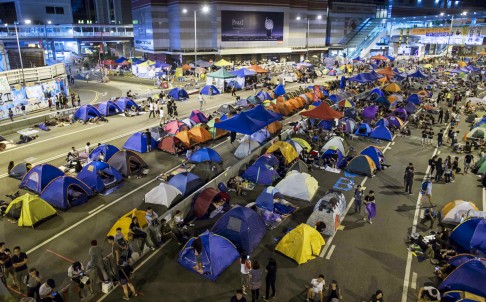
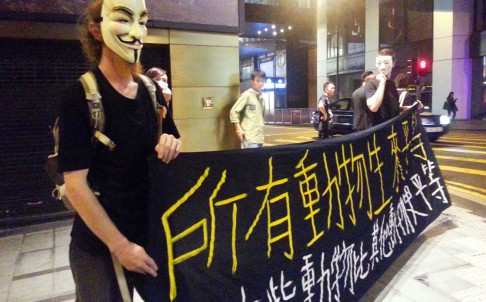
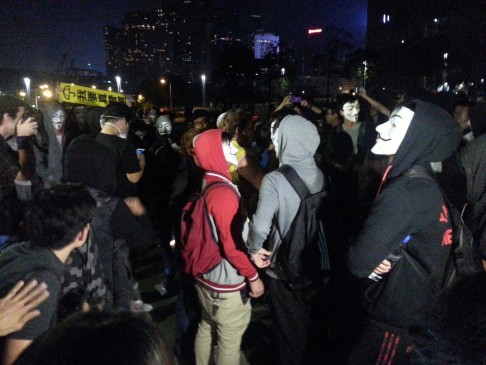

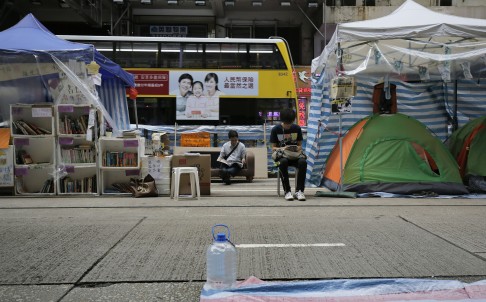
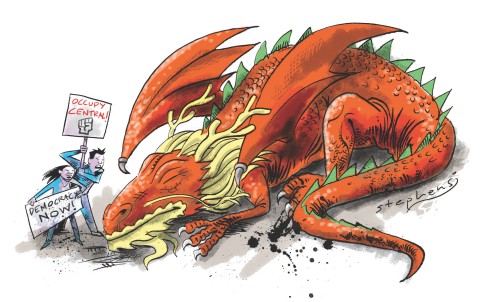
沒有留言:
張貼留言